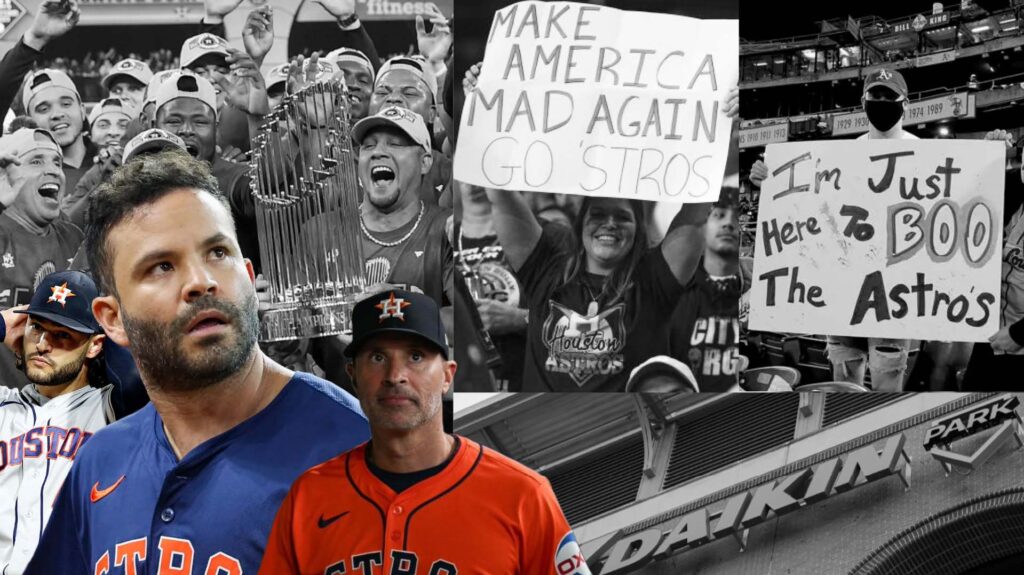PHOENIX — In September of 2022, just weeks before the World Series, a trend started to spread across TikTok and much of social media over a straightforward question of the most significant historical events in human history. The question: “How often do you think about the Roman Empire?”
For most reading it, it seems like a run-of-the-mill concept to go up to a random person and give their thoughts on something that took place thousands of years ago, but in the context of the younger generation, it was deemed hilarious towards males in particular. For the better part of a decade now, baseball fans have been asking themselves a very similar-minded question surrounding one franchise, making them not laugh but instead feel deep anger and disgust. One that, like the Roman Empire, seemed unstoppable at its peak and inevitable at every turn.
It’s hard to overstate how dominant the Houston Astros have been since 2015. Since joining the American League in 2013, their evolution from a rebuilding bottom-feeder into a powerhouse reshaped the league. From 2017 to 2023, Houston made seven consecutive ALCS appearances, four American League pennants, and two World Series titles (2017 and 2022)—a run of prolonged success that was rivaled only by the 21st-century dynasties of the Yankees, Red Sox, and Giants.
They transformed the analytical baseball world, leveraging information-driven strategies and creative player development techniques to maximize their talent, leading to those like José Altuve, Alex Bregman, and Yordan Alvarez becoming stars. Meanwhile, a steady infusion of homegrown players combined with shrewd trades kept them in contention despite the departures of core players such as George Springer, Carlos Correa, and Gerrit Cole. However, the Astros were more than just a winning machine—akin to the Roman Empire, they were baseball’s ultimate antagonist. The fallout from the 2017 sign-stealing scandal made them pariahs in the eyes of many, but it also fueled their resilience. With each deep playoff run, the Astros embraced the villain role, thriving under the weight of hostility and hostility-induced motivation.
But dynasties rarely end with a definitive crash. Instead, they erode, slowly losing the edges that made them indomitable. And now, Houston is starting to show its age. The 2024 season was their most turbulent in years, as despite securing a wild-card berth, they failed to win a single playoff game, proving their cracks are becoming more visible.
Altuve, the heart and soul of the franchise, is 34 and beginning to show signs of decline. Bregman, once the team’s fiery leader, has fled off to Boston to secure his long overdue payday, and injuries have taken a toll on the once-dominant pitching staff, as those like Framber Valdez and Cristian Javier, once reliable anchors, struggled with inconsistency last season.
Meanwhile, once brimming with impact prospects, the farm system has thinned. Years of dealing away young talent to fortify their championship-contending rosters have left the Astros with fewer reinforcements, and the once-revolutionary player development pipeline no longer churns out immediate-impact stars as it did in the late 2010s.
Heading into the 2025 season, the Astros face an uphill battle. The American League landscape is no longer theirs to dominate. Teams like the Baltimore Orioles and Texas Rangers have surged to prominence with younger, dynamic rosters, while the Seattle Mariners threaten Houston’s hold on the AL West. For the first time in years, the Astros’ margin for error is razor-thin. Their rotation, once a strength, is now full of question marks. Valdez, Javier, and Hunter Brown need
bounce-back seasons, while the unproven back end of the rotation will test their depth. The bullpen, once elite, is increasingly unreliable.
Offensively, Alvarez remains the most feared hitter in the lineup, but he can’t carry the team alone. The supporting cast is aging and less productive, and players like Jeremy Peña, once viewed as Correa’s successor, have plateaued rather than blossomed. And with the Astros’ payroll tightening, there is less flexibility to add reinforcements via free agency.
Regardless of how the 2025 season unfolds, the Astros’ dynasty has already cemented its place in baseball history. Their decade of dominance left a lasting mark on the sport for their success and how they changed the game. Their heavy use of analytics, emphasis on player development, and aggressive lineup construction have been widely emulated.
However, they will forever be linked to the scandal. The sign-stealing saga will always be a black mark on their legacy, casting a shadow over their achievements. Even as time softens some animosity, the Astros’ image as baseball’s villains won’t be easily shed.
Every dynasty eventually falls. The Yankees of the late ‘90s, the Giants of the early 2010s, and now, perhaps, the Astros of the 2017-2025 era have, in their way, embraced their Caesar-esque inevitability. The Astros, once baseball’s most hated and envied team, are entering their next chapter.
But one thing is sure: baseball’s “Roman Empire” that once ruled the sport is fading. The Astros are no longer the team everyone fears—they are now the team everyone hopes to topple. So, if you ask a baseball fan in 2025, “How often do you think about the Houston Astros?” Their likely response: “More than I should.”


